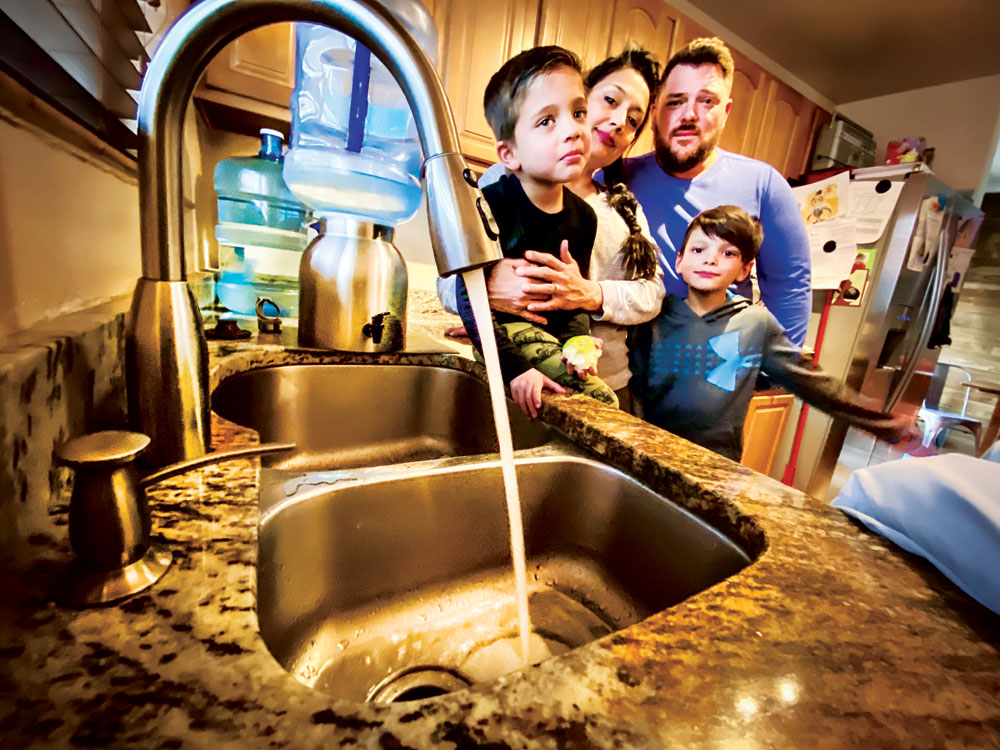
Based on a concern about their water quality, the DeCelles family requested a free test kit from Denver Water for their 1941 home and learned they have lead in their water. Pictured are Jasmine and Jon DeCelles with their children Jameson and Jackson.
East Colfax homeowner Jasmine DeCelles recalls when her husband was washing something in the sink back in 2017 and noticed “a yucky film over the top of water sitting in a clean bowl.” Not even thinking about lead at the time, she requested a free testing kit from Denver Water, hoping to learn what was causing the water’s iridescent appearance.
DeCelles never learned the cause—Denver Water’s testing kit only determines lead content. But the tests (first of cold water drawn immediately, then two more tests after water continues to run) did tell her the water they had been using for drinking, bathing small children, preparing formula and cooking contained lead. Her tap water measured at 3 parts per billion (ppb); the EPA’s “action level” is 15 ppb. At that time (in 2017), DeCelles was disappointed to learn that Denver Water didn’t offer anything more than a loan to replace homeowners’ service lines.
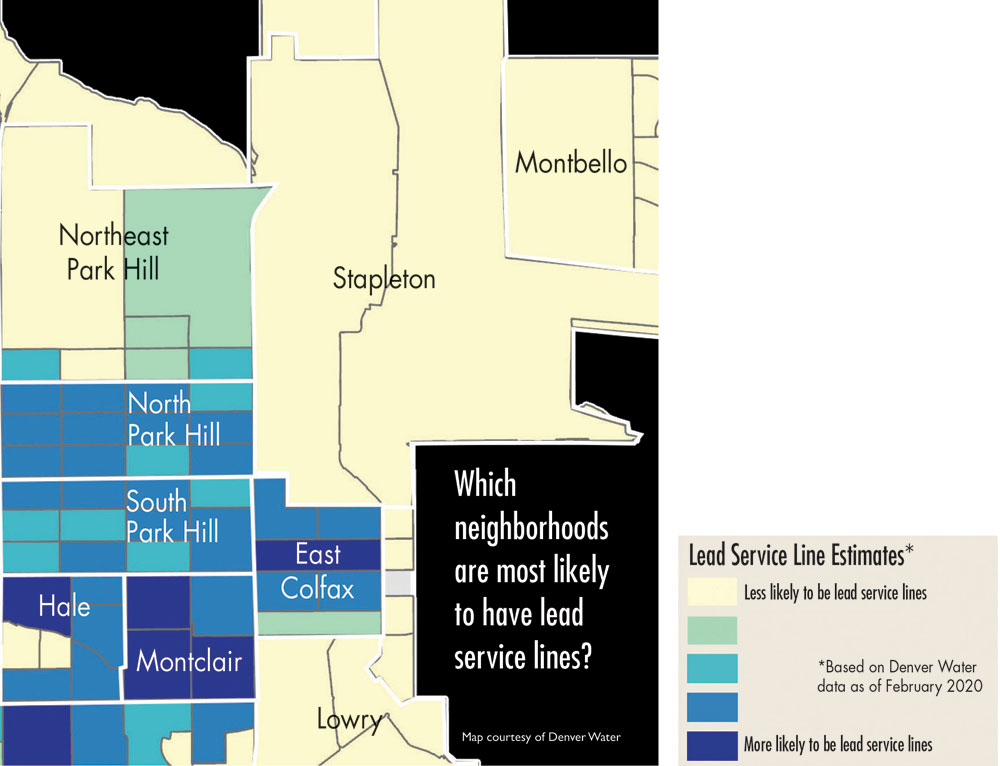
As part of Denver Water’s new Lead Reduction Program, renters and homeowners in housing with “known or likely” lead service lines can expect to see water filters and pitchers in their mailboxes sometime in March, as well as information about replacement of lead service lines.
DeCelles and her husband decided to replace all the water pipes in their 1941 home. A plumber determined their services lines were copper and didn’t merit replacing; however, a lead test of their water in 2019 showed a level of 6.9 ppb, more than double that of the 2017 test. These unexpected results have left the DeCelles family wondering what else can be done to solve their lead problem. They now make weekly trips to the grocery store for reverse osmosis water (treated to remove lead). “I fill up four or five five-gallon containers…and I just tell the kids not to put bath water in their mouths.” DeCelles had her children tested in 2017 and learned their levels were very low. According to the CDC “No safe blood lead level in children has been identified,” and preventing exposure to lead is the most important step parents and communities can take.
In March 2020, Denver Water is launching a 15-year Lead Reduction Program to eliminate one of the largest home lead sources: old lead service lines that connect homes to Denver Water’s delivery system, replacement of which is an expense that would normally fall to homeowners. In East Colfax, Park Hill, Mayfair, Montclair, and other neighborhoods where residences predate 1951, people can expect to see utility vehicles as Denver Water replaces these service lines. This process may impact traffic flow as well as require some crews to access basements to replace customers’ aging pipes.
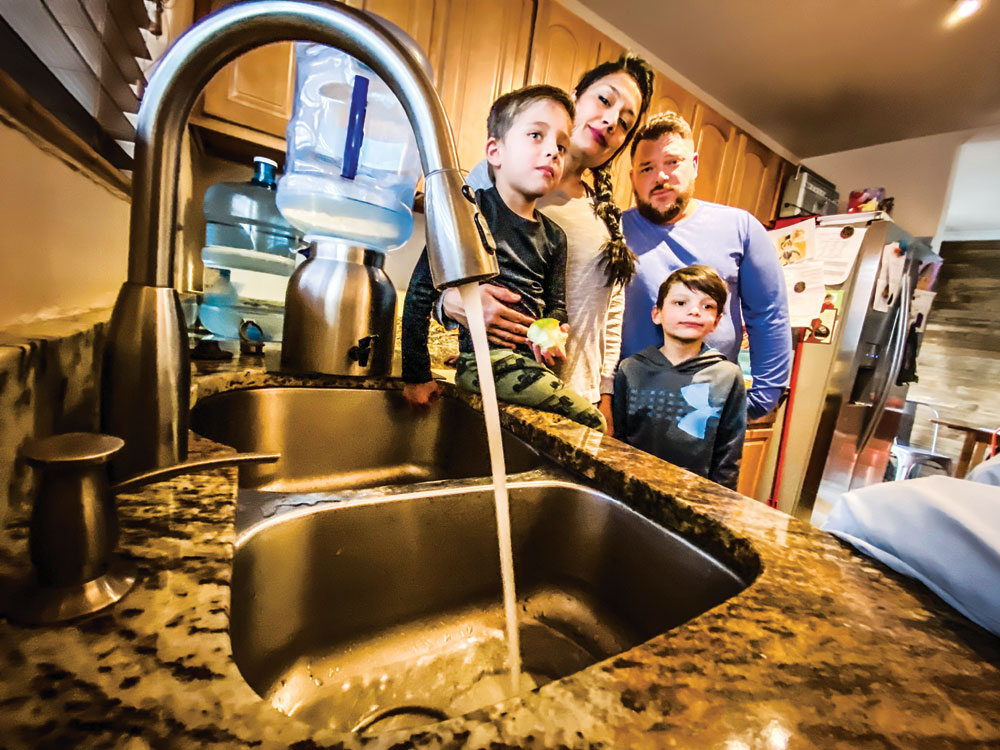
The DeCelles family has used only bottled water since learning their water contains lead.
For those in housing with “known or likely” lead service lines, Denver Water is providing free water pitchers and replacement filters that remove 99% of lead. Residents will see those in their mailboxes beginning in March. The utility has worked to reduce lines’ corrosion through pH/alkalinity adjustments for decades, but in March will further increase the pH range, to 8.5-9.2 (7 is neutral).
These changes are happening after the EPA agreed, in Dec. 2019, that these efforts would “provide health benefits and will be as protective in lowering the lead levels” as the requirements they had previously been following under the Lead and Copper Rule. Travis Thompson of Denver Water says before the EPA approved this new Lead Reduction Program, service lines—which belong to individual property owners—were outside of the utility’s bounds. For this reason, having a water utility replace service lines is unprecedented in the U.S., he says. “No other utility in the nation is taking this proactive and voluntary approach.”
No federal funding comes with this new lead reduction effort, but Denver Water has budgeted for these costs as part of its capital project planning. As with other infrastructure costs, says Thompson, Denver Water will pay for this ambitious project through “customer water rates, bonds, new tax sales fees, hydropower generation.” Denver Water will also explore grant opportunities to support the initiative. “Obviously, we [Denver Water] want to get all of the lead risks out of the system…This is a holistic approach…and really it protects future generations as well.”
Many adults recall when Congress banned lead in paint and most gasolines and undoubtedly imagine that these mandates eliminated or minimized the risk of lead exposure. They did help: a national survey showed average adult blood lead levels declined from about 15 µg/dL (ppb) in the 1970s to 1–2 µg/dL by 2007.* But today, pre-1951 pipes that deliver water to homes, schools, and businesses may leach lead into water as they corrode, especially in areas with more acidic water. “Just because you have a lead service line doesn’t mean you have high exposure to lead. We’ve taken precautions…to increase the pH in the past and there’s protective coating that we created that is separating the water from the actual lead pipe,” says Thompson.
Lead poses significant health risks, especially for children, pregnant women, and other susceptible populations; typically, symptoms don’t appear until after one has accumulated a dangerous amount in the bloodstream. “As the level of lead in children’s blood increases from 0 to 100 ppb, IQ scores drop about 6 points,” says Dr. Bruce Lanphear, a Health Sciences professor at Simon Fraser University in Vancouver. Lanphear recently spoke in Denver on the impact of toxins on children and adults, and says lead service lines are second only to house-dust as a source of elevated lead levels. There is no safe level of lead for humans. Lead toxicity can result in developmental delays, learning disabilities, premature birth, kidney damage, and even death.
For more information, call 303-893-2444 or email lead@denverwater.org. Denver Water’s Lead Reduction Program website will soon allow residents to enter a street address to determine whether their home is among those that likely still have lead pipes: https://www.denverwater.org/your-water/water-quality/lead/lead-reduction-program. For more information on lead in your water, CLICK HERE. The DeCelles’ lab results, are posted below.
* The National Health and Nutrition Examination Surveys – https://www.ncbi.nlm.nih.gov/pmc/articles/PMC1797860/
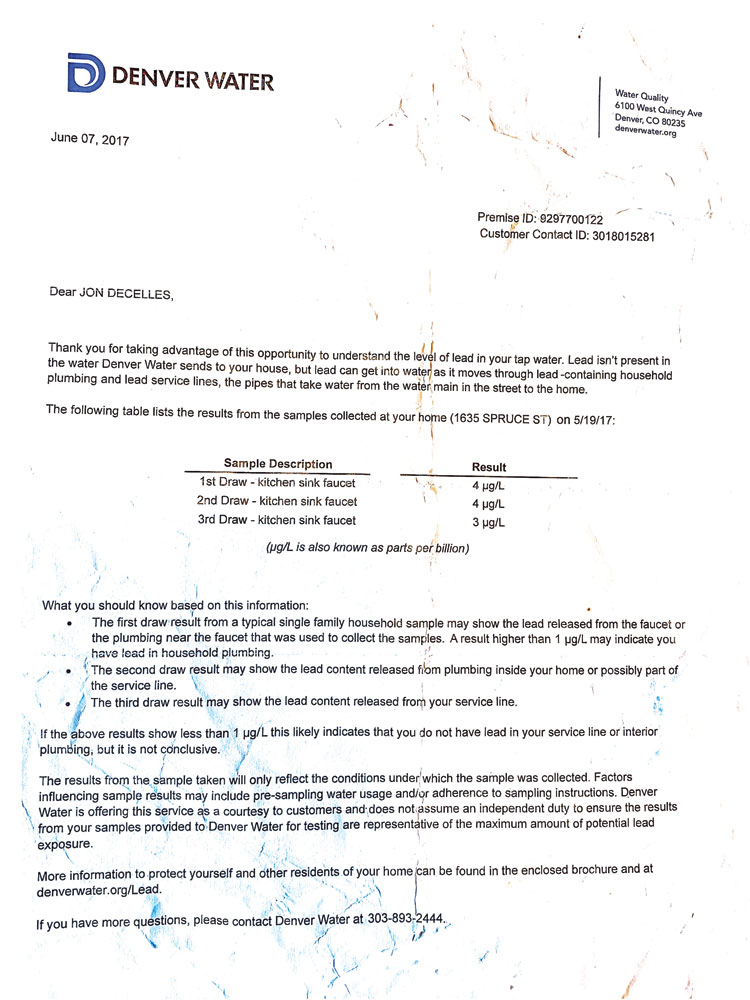
First water testing for lead from June 7, 2017.
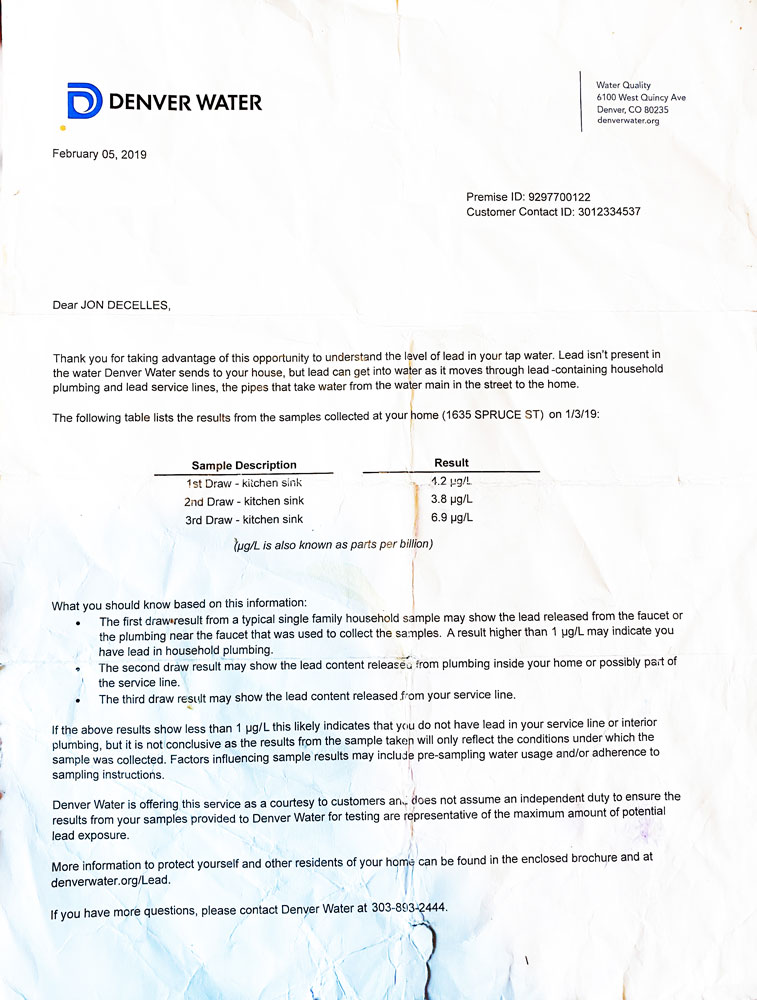
Second water testing for lead from February 5, 2019.



0 Comments